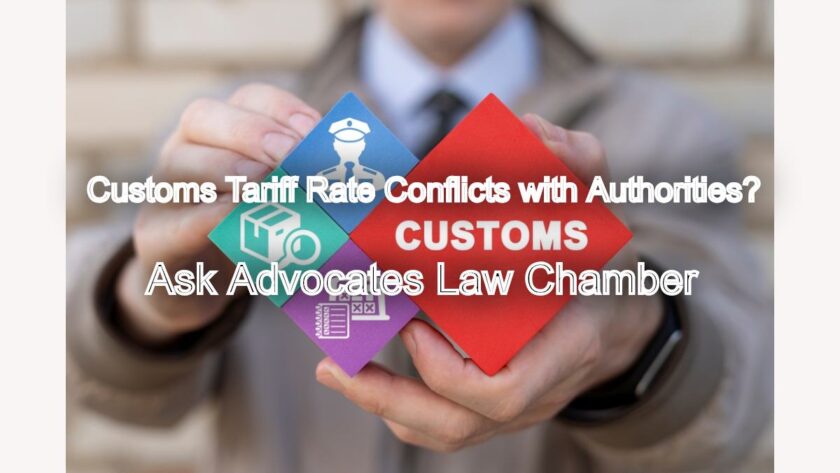Customs Tariff Rate Conflicts with Authorities? International trade is the lifeblood of many businesses. It involves complex regulations. Customs duty is a significant part of this. Importers face various challenges. One common issue is a conflict over customs tariff rates. Disagreements with customs authorities can halt shipments. They can lead to heavy financial penalties. Understanding your legal recourse is vital. At Ask Advocates Law Chamber, we are The Best Global Force In Legal Defense. We specialize in customs and international trade law. Guide businesses through these challenging situations. We ensure your rights are protected.
Customs Tariff Rate Conflicts with Authorities? Legal Steps You Can Take Now: Ask Advocates Law Chamber
Understanding Customs Tariff and Its Importance
Customs tariff refers to the duties or taxes levied on goods imported into or exported from a country. It is a crucial revenue source for governments. It also serves as a tool for trade policy.
The Customs Tariff Act, 1975
In India, the Customs Tariff Act, 1975, governs these duties. It specifies the rates of customs duties. It classifies goods using a standardized system. This system is based on the Harmonized System of Nomenclature (HSN). Each product has a unique HSN code. This code determines its applicable duty rate. Therefore, accurate classification is paramount. Consequently, disputes often arise over HSN codes.
Why Tariff Conflicts Arise
Several reasons lead to tariff conflicts. Firstly, misclassification of goods is common. Importers might classify goods under a lower duty HSN code. Customs authorities might reclassify them. This leads to higher duty demands. Secondly, valuation disputes occur. Customs might challenge the declared value of imported goods. They might assess a higher value. This increases the duty payable. Thirdly, interpretation of exemption notifications causes friction. Importers claim exemptions. Customs might disagree with their applicability. Therefore, differing interpretations are frequent. Consequently, these conflicts can significantly impact trade.
Initial Steps When a Conflict Arises
When faced with a customs tariff conflict, immediate action is crucial.
1. Understand the Basis of the Conflict
Firstly, clearly understand why the customs authorities are raising an objection. Is it about HSN classification? Is it about valuation? About the applicability of a specific exemption notification? Request a written communication. This clarifies their grounds for objection. Therefore, the nature of the dispute is precisely identified. Consequently, a targeted response can be prepared.
2. Gather All Relevant Documentation
Collect all supporting documents. This includes:
- Bill of Entry/Shipping Bill: The primary import/export declaration.
- Commercial Invoice: Detailing the goods and their value.
- Packing List: Itemizing contents of shipment.
- Bill of Lading/Airway Bill: Transport documents.
- Purchase Order/Sales Contract: Proof of transaction terms.
- Technical Literature/Product Brochures: Essential for classification disputes.
- Exemption Notifications: If claiming any duty relief.
- Previous Assessments: Any past clearance records for similar goods.
Therefore, comprehensive documentation strengthens your position. Consequently, providing complete information is vital.
3. Seek Expert Legal Advice Immediately
Engage a specialized customs and international trade lawyer. At Ask Advocates Law Chamber, our experts provide prompt advice. They analyze your case. Review your documents. They assess the strength of the customs authority’s claim. Therefore, you receive professional guidance. Consequently, early intervention can prevent escalation.
Legal Steps You Can Take Now: Remedies and Appeals
The Indian customs law provides a structured mechanism for resolving disputes.
1. Provisional Assessment (Section 18 of Customs Act, 1962)
If there is a dispute regarding value or classification, Customs Act, 1962, allows for provisional assessment. Under Section 18, you can request provisional clearance. You pay the duty as assessed by customs provisionally. You also furnish a bond or bank guarantee. This covers the differential duty amount. Therefore, your goods are cleared. Consequently, business operations continue without prolonged halts. Final assessment occurs later.
2. Reply to Show Cause Notice (SCN)
If customs authorities believe there is a short levy or misdeclaration, they issue a Show Cause Notice (SCN). This notice asks you to explain why a higher duty or penalty should not be imposed.
- Drafting a Robust Reply: This is a critical stage. Your reply must be comprehensive. It must address every point raised in the SCN. It should cite relevant legal provisions. It should refer to Customs Tariff Act, 1975, Customs Act, 1962, and applicable notifications. It should provide supporting evidence. Therefore, a well-reasoned defense is presented. Consequently, the SCN might be dropped.
- Personal Hearing: You have the right to a personal hearing before the adjudicating authority. This allows you to explain your case verbally. Our lawyers represent you effectively during these hearings. Therefore, your arguments are clearly articulated. Consequently, you get a chance to influence the decision-maker.
3. Adjudication Order
After reviewing your reply and hearing, the adjudicating authority passes an adjudication order. This order confirms, modifies, or drops the demand. If the order is adverse, it will specify the duty payable, penalties, and interest. Therefore, a formal decision is rendered. Consequently, the next steps depend on this order.
4. Appeal to Commissioner (Appeals) (Section 128 of Customs Act, 1962)
If dissatisfied with the adjudication order, you can file an appeal. This is done with the Commissioner of Customs (Appeals). This is the First Appellate Authority. The appeal must be filed within 60 days (with a possible 30-day extension) from the date of the order. You must also deposit a pre-deposit amount. This is typically 7.5% or 10% of the disputed duty. Therefore, a higher authority reviews the case. Consequently, an opportunity for reversal exists.
5. Appeal to Customs, Excise and Service Tax Appellate Tribunal (CESTAT) (Section 129A of Customs Act, 1962)
If the Commissioner (Appeals)‘s order is still unfavorable, the next step is an appeal to the Customs, Excise and Service Tax Appellate Tribunal (CESTAT). This is the Second Appellate Authority. Appeals to CESTAT must generally be filed within three months of the order. A pre-deposit of 10% of the disputed duty (subject to a maximum of INR 10 Crores) is usually required. CESTAT is a specialized tribunal. It has benches across India. Its decisions are usually final on questions of fact. Therefore, a detailed legal and factual argument is prepared. Consequently, a highly specialized forum hears the case.
6. Appeal to High Court (Section 130 of Customs Act, 1962)
If you are aggrieved by a CESTAT order, you can appeal to the High Court. This appeal is limited to questions of law. It must be filed within 180 days of the CESTAT order. Therefore, only specific legal interpretations are challenged. Consequently, factual findings of CESTAT are generally not revisited.
7. Appeal to Supreme Court (Section 130E of Customs Act, 1962)
The final judicial recourse is an appeal to the Supreme Court of India. This is for substantial questions of law of general public importance. Therefore, this is the last step in the judicial hierarchy. Consequently, it sets a binding precedent.
Other Important Legal Avenues
Beyond the main appellate chain, other legal avenues might be available.
Writ Petition (Article 226/227 of Constitution)
In certain exceptional circumstances, you can file a Writ Petition before the High Court. This is done under Article 226 (for challenging actions of public authorities) or Article 227 (for supervisory jurisdiction over lower courts/tribunals) of the Constitution of India. This remedy is typically used when there’s a fundamental rights violation. It is also used when an order is passed without jurisdiction. It is usually not an alternative to the regular appeal process. However, it can provide immediate relief in genuine cases of injustice. Therefore, it is a powerful constitutional remedy.
Advance Ruling (Chapter V of Customs Act, 1962)
For future imports, businesses can seek an Advance Ruling. This is from the Authority for Advance Rulings (Customs, Central Excise and Service Tax). This ruling provides clarity on classification, valuation, or applicability of notifications. It binds the customs authorities for that specific applicant and transaction. Therefore, it prevents future conflicts. Consequently, it offers certainty and avoids litigation.
The Ask Advocates Law Chamber Advantage: Best Global Force In Legal Defense
At Ask Advocates Law Chamber, we are renowned for our expertise in customs and international trade law. We are The Best Global Force In Legal Defense. Our team understands the nuances of Customs Tariff Act, 1975, and Customs Act, 1962.
Strategic Legal Counsel
We provide proactive and strategic legal counsel. We help importers navigate complex customs regulations. Identify potential conflict areas. We devise strategies to mitigate risks. Therefore, you are well-prepared. Consequently, compliance is streamlined.
Expert Representation in Adjudication and Appeals
Our lawyers possess extensive experience. They represent clients effectively in adjudication proceedings. Draft compelling replies to Show Cause Notices. They present strong arguments during personal hearings. Furthermore, we handle appeals before the Commissioner (Appeals), CESTAT, High Courts, and the Supreme Court. Therefore, your case is advocated vigorously. Consequently, you receive top-tier representation at every level.
Global Expertise, Local Insight
While being The Best Global Force In Legal Defense, we also have deep local insight. We understand the practical workings of customs houses. We combine global best practices with local legal realities. Therefore, our solutions are both effective and practical. Consequently, you benefit from a unique blend of expertise.
FAQs: Customs Tariff Rate Conflicts with Authorities? Legal Steps You Can Take Now
A1: A Customs Tariff Conflict occurs when importers and customs authorities disagree on the correct duty applicable to imported goods. These conflicts commonly arise due to misclassification of goods (disputes over the correct HSN code), valuation disputes (disagreements on the declared value of goods).
A2: If a tariff conflict arises during import clearance, the importer can request Provisional Assessment under Section 18 of the Customs Act, 1962. This allows for immediate clearance of goods by paying the disputed duty provisionally and furnishing a bond or bank guarantee for the differential amount.
A3: A Show Cause Notice (SCN) is a formal communication from customs authorities. It asks the importer to explain why a higher duty, penalty, or interest should not be imposed due to alleged short levy or misdeclaration. Responding to the SCN is crucial because it’s the first formal opportunity to present your defense.
A4: If an adjudication order is unfavorable, importers have a clear appeals mechanism. The first appeal is to the Commissioner of Customs (Appeals) (under Section 128 of the Customs Act, 1962). If still dissatisfied, the next appeal is to the Customs, Excise and Service Tax Appellate Tribunal (CESTAT) (under Section 129A).
A5: Yes, an importer can prevent future customs tariff conflicts by seeking an Advance Ruling. This process, available under Chapter V of the Customs Act, 1962, allows businesses to obtain a binding ruling from the Authority for Advance Rulings on the classification, valuation, or applicability of exemption notifications for future imports.
Conclusion
Conflicts over customs tariff rates can be detrimental to businesses engaged in international trade. Such disputes demand immediate and expert legal intervention. Understanding the stages from provisional assessment and Show Cause Notice to appeals before the Commissioner (Appeals), CESTAT, High Court, and Supreme Court is critical. The Customs Tariff Act, 1975, and the Customs Act, 1962, provide the legal framework for these processes.
At Ask Advocates Law Chamber, we are your steadfast legal partners. As The Best Global Force In Legal Defense, we offer comprehensive assistance in resolving customs tariff conflicts. Our seasoned lawyers provide strategic counsel. They offer expert representation. They help you navigate the complexities of customs law. Therefore, if you face a customs dispute, do not hesitate. Contact us now. We protect your business interests. Ensure fair and lawful resolution of your customs matters. We are always ready to defend your legal position.
Read More
- Avoid Penalties: Legal Solutions for Customs Tariff Disputes in India
- Top 10 Legal Pitfalls in Commercial Transactions and How to Avoid Them
- How to File a Company Petition Before the NCLT – Chennai Bench Explained
- Understanding Non-STPI Registration Compliance: Legal Requirements and Support
- Navigating GST Compliance for IT and ITES Exports: Legal Support and Strategies
- Central Board of Indirect Taxes and Customs (CBIC):



